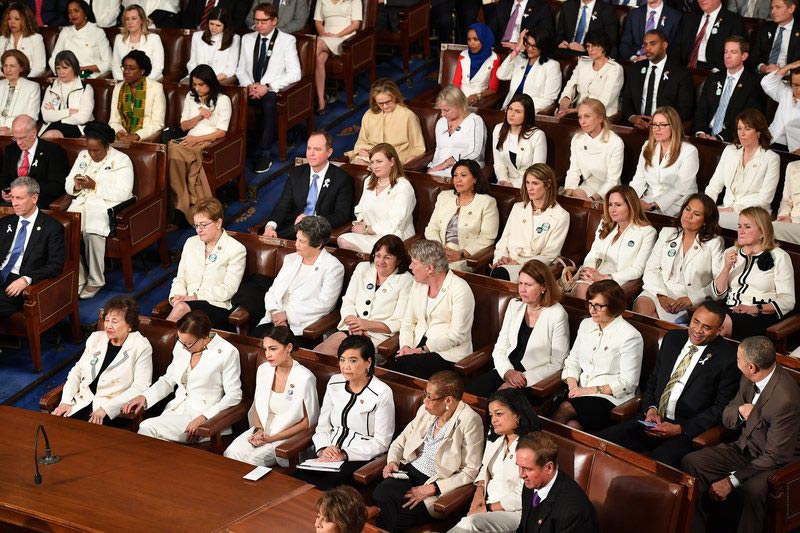13%的美国人认为女性“从情感上”没有男性适合从政

|
2019年对政界女性来说是个好年头吗?问题看似很容易回答。毕竟,目前有6名女性在争取民主党总统候选人资格,创下历史纪录,而在第116届国会里,女性议员人数也超过以往。 然而,乔治敦大学教育与劳动力中心(CEW)公布的一项最新分析表明,尽管取得了不可否认的进步,女性候选人仍然面临着与能力或资格完全无关的障碍。因为13%的美国人,或者说约十分之一的人仍然认为男性从“情感上”比女性更适合从政。 这是20世纪70年代以来,研究人员通过社会调查一直在问的问题(这也解释了相关措辞有些过时的原因)。乔治敦大学教育与劳动力中心的首席经济学家、也是该报告的合著者尼克·史密斯表示,尽管报告没有详细说明女性在情感方面具体存在怎样的缺陷,但“潜台词”很明确。 “如果使用‘情绪’这个词,还放在与‘女性’有关的话里,就是刻板印象。意思是涉及非常重要的决定时……女人更可能受情绪影响,不够理智。” 史密斯告诉《财富》杂志。“相关担心符合女性容易歇斯底里的成见,即女性可能控制不住脾气,因而不应该让女性负责重要事务。” 不过,虽然“歇斯底里的女人”这个老掉牙的比喻依然存在令人沮丧,分析也显示刻板印象正在逐渐消失。认为男性更适合从政的美国人比例在1975年达到50%左右的峰值,此后一直呈下降趋势。研究人员发现,关于谁最有可能认同女性不太适合从政观点方面,许多区别正在逐渐打破。举例来说,在过去几十年内,年轻人和老年人持此观点人数的差距已经显著缩小。 然而,对于如何看待该问题方面仍然有两个因素很重要:政治背景和教育程度。分析显示,两种性别里,比起“坚定民主党人”,“坚定共和党人”对女性从政存在偏见的可能性几乎是三倍。教育程度方面,高中文凭以下者认为男性从情感上更适合从政的可能性约为拥有学士学位者的两倍。 对女性候选人来说,含义显而易见。正如史密斯所说,13%已经可以“左右成败”,女性只能艰难争取“好感度”,还要承受从面部表情到衣着等各种方面的肤浅判断。 “女人从政的起点与男性并不在同一条起跑线。”史密斯说。“从一开始女性就落后了四五步。”(财富中文网) 译者:冯丰 审校:夏林 |
Is 2019 a good year to be a woman in politics? It seems like a simple question. After all, there are currently a record six women running for the Democratic presidential nomination, while the 116th Congress includes more female lawmakers than ever before. Yet a new analysis from the Georgetown University Center on Education and the Workforce (CEW) suggests that, despite the undeniable progress, female candidates continue to face a significant headwind that has absolutely nothing to do with their abilities or qualifications: 13% of Americans—or roughly one in 10—still believe men are better “emotionally suited” for politics than women. That’s a question researchers have been asking via the General Social Survey since the 1970s (which explains the dated-sounding turn of phrase). And although it doesn’t specify what, exactly, the respondents believe women’s emotional shortcomings to be, Nicole Smith, chief economist at CEW and co-author of the report, says the “subtext” of the question is clear. “When you use the word ’emotion’ and you put it in the same sentence ‘women,’ it’s playing to the stereotype that when it comes to very important decisions… women might be more likely to make an emotional determination with their heart, rather than with their head,” Smith told Fortune. “Part of the concern here plays to the stereotype that women can be hysterical, that women can fly off the handle—that women shouldn’t have their finger on the button.” But while it’s depressing to see that the tired old trope of the “hysterical woman” persists, the analysis also shows that stereotype is on the wane. The share of Americans who said men were better suited to politics peaked at about 50% in 1975 and had been trending downward ever since. The researchers found that many of the distinctions about who is mostly likely to buy into the idea that women are less suited are breaking down. For instance, the gap between younger and older respondents has narrowed dramatically over the past decades. There are, however, still two factors that have a significant influence on how one views this issue: political affiliation and education. The analysis shows that “strong Republicans” of both genders are almost three times as likely as “strong Democrats” to show bias against women in politics. On the education side, Americans with less than a high school diploma are almost twice as likely as those with a bachelor’s degree to say men were more emotional suited for the political arena. For female candidates, the implications are clear. Thirteen percent could easily be, as Smith puts it, “the difference between winning and losing”—especially when women face an uphill battle on “likability” and superficial judgements on everything from their facial expressions to their clothing. “Women are not starting at the starting line,” says Smith. “Women are starting four or five paces behind.” |













